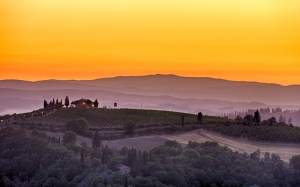Favourite poems: ‘Tuscany’ by Victoria Sackville-West
Favourite poems: ‘Tuscany’ by Victoria Sackville-West
Favourite poems: ‘Tuscany’ by Victoria Sackville-West
-
Hannah
-
Hannah
 In my new novel, The Echoes of Love, Paolo owns a home in Tuscany, and he persuades Venetia to take on a contract based there restoring mosaics in a nearby ruin he has purchased. I love Tuscany, such a beautiful, unspoilt part of the world where romance is intrinsic in every detail of the landscape, and I very much enjoyed describing this part of the country:
In my new novel, The Echoes of Love, Paolo owns a home in Tuscany, and he persuades Venetia to take on a contract based there restoring mosaics in a nearby ruin he has purchased. I love Tuscany, such a beautiful, unspoilt part of the world where romance is intrinsic in every detail of the landscape, and I very much enjoyed describing this part of the country:
The Tyrrhenian coast glowed under the wide arc of a burning, cloudless blue sky, the sea a shimmering golden mirror; the sweeping coastline looked out over the distant islands of the Tuscan Archipelago, echoing their beauty with its wild and mountainous landscape, the pale rock densely interspersed with exotically green pine groves, and its almost luminescent aquamarine waters lapping the shores Tuscany.
I love poetry that conjures up images of the Tuscan setting, and none more so than a poem simply entitled ‘Tuscany’ by Victoria Sackville-West, Baroness Sackville. Victoria (1862–1936) is perhaps best remembered for her daughter, the writer Vita Sackville-West, but she was a wonderful writer in her own right (and, interestingly, the illegitimate daughter of the 2nd Baron Sackville and a Spanish dancer known as Pepita – no wonder she writes with such passion). Victoria was close friends with the famous sculptor Auguste Rodin; you can see his bust of her in the Musée Rodin.
I hope you enjoy this poem, and find that it transports you to the warmth and colours and beautiful earthiness of Tuscany.
Tuscany
Cisterns and stones; the fig-tree in the wall
Casts down her shadow, ashen as her boughs,
Across the road, across the thick white dust.
Down from the hill the slow white oxen crawl,
Dragging the purple waggon heaped with must,
With scarlet tassels on their milky brows,
Gentle as evening moths. Beneath the yoke
Lounging against the shaft they fitful strain
To draw the waggon on its creaking spoke,
And all the vineyard folk
With staves and shouldered tools surround the wain.
The wooden shovels take the purple stain,
The dusk is heavy with the wine’s warm load;
Here the long sense of classic measure cures
The spirit weary of its difficult pain;
Here the old Bacchic piety endures,
Here the sweet legends of the world remain.
Homeric waggons lumbering the road;
Virgilian litanies among the bine;
Pastoral sloth of flocks beneath the pine;
The swineherd watching, propped upon his goad,
Urder the chestnut trees the rootling swine
Who could so stand, and see this evening fall,
This calm of husbandry, this redolent tilth,
This terracing of hills, this vintage wealth,
Without the pagan sanity of blood
Mounting his veins in young and tempered health?
Whu could so stand, and watch processional
The vintners, herds, and flocks in dusty train
Wend through the golden evening to regain
The terraced farm and trodden threshing-floor
Where late the flail
Tossed high the maize in scud of gritty ore,
And lies half-buried in the heap of grain
Who could so watch, and not forget the rack
Of wills worn thin and thought become too frail,
Nor roll the centuries back
And feel the sinews of his soul grow hale,
And know himself for Rome’s inheritor?